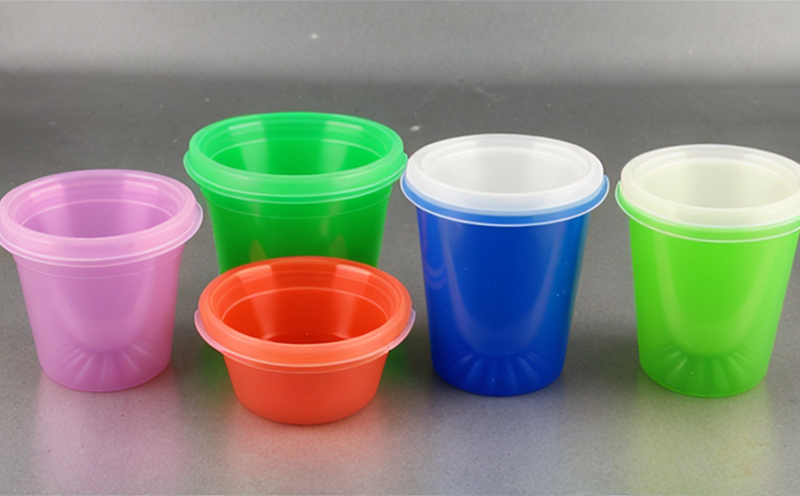ASTM D1709 Dart Impact Testing of Disposable Plastic Films
The ASTM D1709 dart impact test is a critical procedure used to evaluate the puncture resistance and mechanical strength of disposable plastic films. This test simulates real-world conditions where these materials are exposed to sharp, pointed objects such as needles or pins, which can lead to potential breaches in packaging or containers.
The testing process involves subjecting a specimen cut into specific dimensions (typically 102 mm x 56 mm) to a standard impact from a weighted dart. The height at which the dart impacts the film is precisely controlled and standardized, ensuring consistent results across different laboratories. The primary parameter measured is the force required to puncture the film or the distance it travels before doing so.
The purpose of this test is multifaceted: it ensures product safety by identifying any weak points in the plastic films that could compromise integrity during use. For instance, in medical applications like syringes and IV bags, ensuring robustness is paramount to prevent leaks or failures under stress. Additionally, manufacturers rely on ASTM D1709 results to optimize material selection and process parameters for producing high-quality disposable plastics.
In the context of polymer & plastics testing, particularly focusing on disposable plastic films, this test plays a crucial role in quality control and compliance with regulatory standards. By adhering strictly to ASTM guidelines, companies can demonstrate adherence to international best practices, thereby enhancing their reputation among clients and stakeholders.
The apparatus required for performing the ASTM D1709 test includes a specially designed dart impact tester capable of delivering precise impacts at controlled heights. Specimens must be prepared according to specified dimensions, ensuring uniformity across samples. Proper specimen preparation is essential as variations in size or shape can affect test outcomes.
Once tested, the results are analyzed using ASTM D1709 criteria which specify both pass/fail limits based on either force required for penetration or distance traveled before penetration occurs. Compliance with these standards ensures that products meet industry expectations regarding safety and performance.
Why It Matters
The importance of ASTM D1709 dart impact testing cannot be overstated, especially in sectors reliant on disposable plastic films. These materials are used extensively across various industries including healthcare, packaging, and consumer goods where puncture resistance is crucial for maintaining product integrity.
From a safety perspective, ensuring that these films can withstand sharp impacts helps protect users from potential injuries caused by compromised packaging or containers. In medical settings, this translates directly into enhanced patient care by reducing risks associated with improper handling of medical devices and supplies.
Compliance with ASTM D1709 also facilitates smoother operations within regulated environments such as hospitals and clinics. Regulatory bodies often require adherence to specific testing protocols like those outlined in ASTM standards when certifying products for use. By meeting these requirements, manufacturers ensure that their goods not only meet but exceed expectations set by governing authorities.
In addition to promoting safety and compliance, ASTM D1709 contributes significantly to innovation within the polymer & plastics industry. Through rigorous testing methods such as this one, researchers and engineers can identify areas for improvement in existing materials or develop entirely new ones tailored specifically towards improved puncture resistance.
Applied Standards
The ASTM D1709 dart impact test is officially recognized by the American Society for Testing and Materials (ASTM) as a standard practice for determining the puncture resistance of flexible plastic films. This widely accepted method provides uniformity in testing procedures, making it easier for laboratories worldwide to compare results accurately.
Other relevant standards include ISO 178 which specifies general requirements for mechanical testing of plastics; EN ISO 527:2012, which deals with tensile and flexural properties of thermoplastics; as well as ASTM D638 used for measuring the tensile strength of plastics. While these do not directly relate to puncture resistance, they complement each other in providing a comprehensive understanding of plastic film characteristics.
By aligning testing procedures with established international standards like those mentioned above, laboratories ensure their findings are valid and reliable. This consistency across different regions fosters trust among stakeholders involved in the manufacturing, distribution, and usage of disposable plastics.
International Acceptance and Recognition
The ASTM D1709 dart impact test enjoys broad international recognition due to its rigorous methodology and consistent results. Laboratories from various countries adhere to this standard when conducting puncture resistance assessments on flexible plastic films.
In Europe, laboratories often comply with both EN standards (European Norms) and ISO specifications. Similarly, Asian markets frequently use ASTM D1709 alongside local equivalents to ensure compatibility with global quality assurance systems. This widespread adoption underscores the importance of this testing technique in maintaining high standards across diverse geographical locations.
Moreover, the acceptance of ASTM D1709 extends beyond mere compliance; it reflects a commitment to excellence and reliability within the polymer & plastics industry. Companies that implement this test demonstrate their dedication to producing safe, effective products that meet international quality benchmarks.





